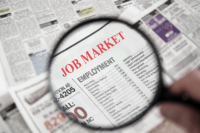The US labor market continues to surprise and the unemployment rate, against the odds, is falling
U.S. employers added 147,000 jobs in June as the American labor market continues to show surprising resilience despite uncertainty over President Donald Trump‘s economic policies. The unemployment rate ticked down to 4.1% from 4.2% in May, the Labor Department said Thursday. Hiring rose modestly from a revised 144,000 in May and beat economists expectations of fewer […]
US job openings in May hit 7.8 million in a continuing display of labor market resilience
WASHINGTON (AP) — U.S. job openings rose unexpectedly in May, a sign that the American labor market remains resilien t in the face of high borrowing costs and uncertainty over U.S. economic policy. U.S. employers posted 7.8 million vacancies in May, the Labor Department reported Tuesday, up from 7.4 million in April. Economists had expected a slight […]
More than 300 job cuts in Virginia, state reports
More than 300 Virginia jobs are being cut in June, including layoffs at CarParts.com, Kroger, and Nakupuna Companies.
Wall Street rises as oil prices ease and the countdown ticks to the Fed’s decision on interest rates
NEW YORK (AP) — U.S. stocks are rising on Wednesday as Wall Street waits to hear where the Federal Reserve may be taking interest rates. The S&P 500 was 0.5% higher in morning trading. The Dow Jones Industrial Average was up 244 points, or 0.6%, as of 10:30 a.m. Eastern time, and the Nasdaq composite was 0.6% higher. […]
The number of Americans filing for jobless benefits last week rises to highest level in eight months
Unemployment claims rose to 247,000, an 8-month high, as tariff uncertainty and corporate job cuts weigh on the U.S. labor market and economic outlook.
Virginia unemployment rate rises slightly in April to 3.3%
Virginia’s unemployment rates continue to see an incremental rise, according to data from the state’s Department of Workforce Development and Advancement, also known as Virginia Works.
Virginia unemployment spike ‘an economic shock,’ economist says
For the week ending May 10, 3,992 people filed initial unemployment insurance claims which is 46.8% higher than the previous week's 2,720 claims and a 67.3% increase over a comparable week last year (2,386).
Virginia could lose 32,000 jobs in 2025, U.Va. estimates
Virginia may lose 32,000 jobs in 2025 amid federal cuts and rising unemployment, according to a new forecast by the University of Virginia’s Weldon Cooper Center for Public Service.
Virginia unemployment claims rise amid federal layoffs
Virginia jobless claims rose in early May, with experts citing federal spending cuts, tariffs and contract reductions as key factors in the surge.
Fed holds interest rate at 4.3% amid tariff and inflation uncertainty
The Fed kept rates steady at 4.3%, citing rising risks of inflation and unemployment due to Trump’s sweeping tariffs on imports from China and beyond.
Is slight rise in Virginia unemployment ‘calm before storm?’
Virginia’s unemployment rate numbers are on a slight rise, according to data from the state’s Department of Workforce Development and Advancement, also known as Virginia Works. The state agency reports that Virginia’s seasonally adjusted unemployment rate in March rose a tenth of a percentage point to 3.2 % compared to 3.1% in February and 2.8% […]
Applications for jobless benefits inch up, but layoffs remain low, labor market healthy
Slightly more Americans applied for unemployment benefits last week, but layoffs remain historically low. U.S. jobless claims filings rose by 2,000 to 223,000 for the week ending March 15, the Labor Department said Thursday. That’s just less than the 224,000 new applications analysts forecast. Weekly applications for jobless benefits are considered a proxy for layoffs, […]























